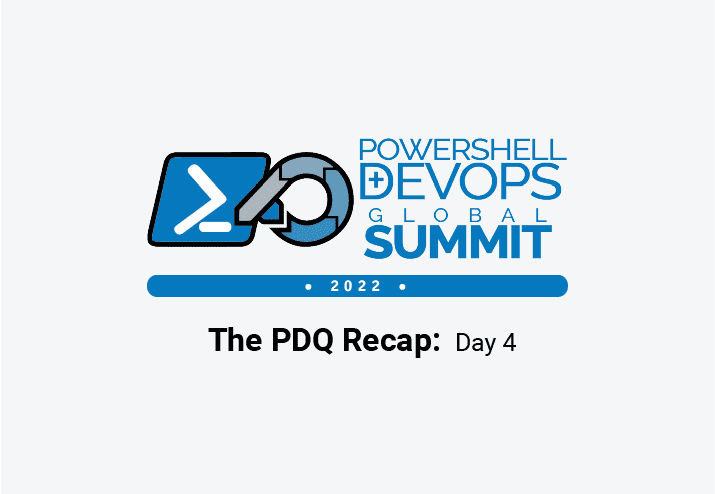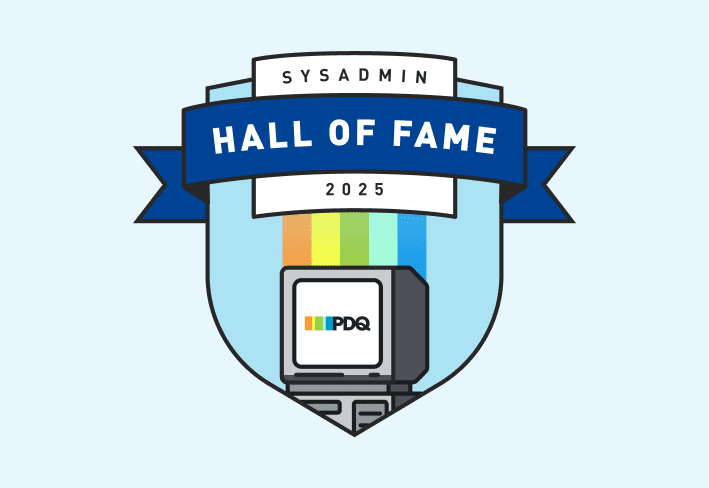We've reached the final day of the 2022 PowerShell + DevOps Global Summit. If you missed our recaps of the first three days of the conference, you can find them here:
While some conferences tend to fizzle out on the final day, the PowerShell Summit is still going full speed ahead, and Jordan Hammond and Andrew Pla are squeezing out every last bit of PowerShell knowledge they can from the conference. Here are some of the biggest takeaways they had from the last day of the conference.
Hallway Track
A common phrase you hear at the summit is the Hallway Track. The Hallway Track is the random conversations you can get into at any moment. Here are a few of the sporadic conversations we had throughout the week that we felt were worth highlighting.
One thing the conference does is encourage you to find a new table to eat at for every meal. It is almost as if they are attempting to force a bunch of introverts into talking to new people. This morning, we had the pleasure of sitting at a table with Sean Wheeler, who is the lead writer for PowerShell. We had a discussion about how important it is to contribute to documentation, even if that is just opening an issue on Github to ask a question. Open source is a discussion first, and opening issues is a great way to start that discussion. When we talked with Sydney Smith and Danny Maertens from the PowerShell team a day earlier, they had this exact same opinion. Asking questions significantly helps them connect with a broader audience.
Late last night, we had the opportunity to talk to Justin Grote, who spoke to us about how he overcame his shyness to speak at conventions. As one of the more recognizable speakers, he is used to getting approached by people, and he talked about how he got better at socializing over the years. Watching him talk now, you would have no idea that he ever struggled with it. He commands the room and makes his talks very entertaining.
Lastly, we got to hang out with Dior Senh, who is in the OnRamp course. He's an up-and-comer in the IT world and spent this week diving into soft skills, DevOps, PowerShell, and more from Jeff Hicks. I can’t think of a better way to jumpstart your career.
AutoRest: The Module Generator
Speaker: Anthony Howell
Attendees: Andrew Pla, Jordan Hammond
AutoRest is a tool that can ingest an API definition file and create a language-specific SDK file. This tool removes many of the hurdles for creating a module, making it possible to have PowerShell cmdlets for any software you have in your environment. This opens up so many doors for automation that you may not have been able to approach before. Azure PowerShell and Microsoft Graph modules are both made with AutoRest, so it seems clear that this is something that Microsoft will continue to invest resources into.
Anthony covered some of the challenges he ran into while making a PowerShell SDK. Check out the documentation for a deep dive. He said his biggest hurdle was creating secure authentication, as the default for his SDK took the password in cleartext. To get around this challenge, he had to build a new command that allowed for secure string authentication. Another problem he ran into was the cmdlet naming pulling in some verbs that were not an ideal fit. However, using directives, you are able to change the naming scheme while it builds. Even better, if your changes make a duplicate command, it will create it once and add the others as additional parameter sets.
AutoRest looked really cool, and while I will need to step into some new territory to fully explore it, I am excited for the challenge. I am not sure which application I will test it with yet, but I look forward to diving into this process to see if I can make a quality module.
Contribute to Docs like a Microsoft Insider
Speakers: Sean Wheeler and Mike Robbins
Attendees: Andrew Pla and Jordan Hammond
This talk was about how important open-source documentation is and how we can help. Good documentation is helpful for everyone, but if you don’t want to do it just out of the goodness of your heart, let's talk about some of the ways it benefits you to contribute.
It is easier to get contributions in for documents than it is for the source code.
It's a great way to learn Markdown and Git if you are just starting with those. Those two skills will always have value when you are contributing to any project.
You get recognition. If you make a commit or open an issue, those are tracked, and they list all the contributors in a "what's new" document.
If you look at the style guide for most documentation at Microsoft, it is different than you will see in PowerShell. Therefore, it is important to note what you are updating and make sure you follow the style guide for that project. One of the guidelines is line length, which is set to 100 characters. To help you make sure you don’t go too long, you can set rulers in viscose that will clearly mark where the cutoff is.
Both speakers also highlighted a few tools that can be used to help ease the process. The first is an extension in VS Code called Reflow Markdown. This extension helps you format your markdown to match the style guide and allows you to set a 100-character limit in the document. The other extension they highlighted is Beyond Compare, which is not free, but could be a valuable tool for speeding up the process. This tool allows you to copy the changes to each version of the documentation, reducing the amount of time it would normally take. It also will prevent you from getting a What Fun (WTF) comment from Mike Robbins.
Iron Scripter
Every year, we end the summit with an Iron Scripter challenge. It is a competition to complete a coding challenge. The teams this year are Battle, Flawless, and Daybreak.
This year's challenge was to build a module to perform various automation tasks.
Justin Grote of Daybreak came out swinging, saying "The other team's code is ugly, and that makes everything harder."
Team Battle was hyper-focused and not available for comment. The strategy was solid as they got code into the repo first.
Andrew Pla and Kevin Marquette of Flawless refused any trash talk because they hate joy.
Overall, everyone was very friendly while I interrupted them during deep focus, proving that it's not just PowerShell that is classy around here.
After patiently waiting for the judges, who seemed to enjoy their time in the spotlight a little too much, Daybreak was declared the 2022 Iron Scripter challenge winner, proving that trash talk is the foundation of elite competition.
For those that are intrigued about the idea of scripting challenges, they are often posted at ironscripter.us. They would love to have everybody join in!
Until next year
We can't say thank you enough to everyone who made this conference possible. The organizers and presenters totally crushed it this year. Also, a massive shout out to all the amazing attendees and the PowerShell community as a whole. Your contributions make this one of the best communities in the world.
If you couldn't attend the conference, we hope our coverage helped you get a taste of what it's like to be there, and hopefully, it inspires you to attend next year.
That wraps things up from the 2022 PowerShell + DevOps Global Summit. We had an absolute blast and can't wait to see what next year brings.



